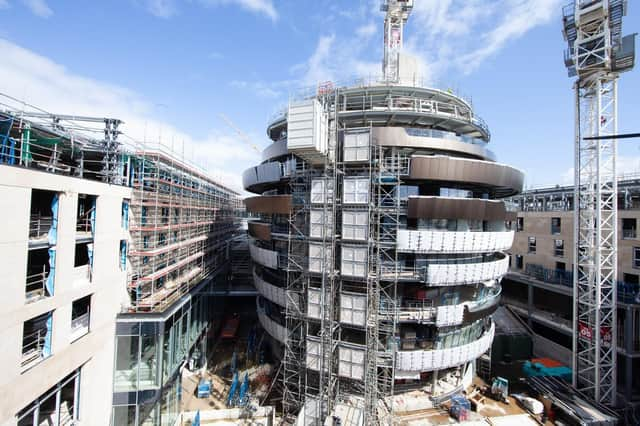Need for business collaboration to rebuild from Covid-19


The discussion, From Crisis to Recovery: Driving Sustainable Recovery in Scotland, was part of The Big Conversation, a series of events organised by Lloyds to bring together a range of expert voices to plot a future beyond the pandemic.
Hosted by Philip Grant, Chair of the Scottish Executive Committee at Lloyds Banking Group, The Big Conversation panel outlined some of the biggest challenges facing SMEs in Scotland this year, but also looked to the future with Grant saying that “we need to look through and beyond the current situation to think of creative ways we can mobilise the economy and recover it”.
One solution put forward by Tracy Black, the Director of CBI Scotland was for a new National Commission for Economic Recovery to be established involving participation from government, business and wider stakeholders. Black told the round-table of fellow business leaders: “This crisis is so large and so significant that it needs that level of collaboration [that a Commission would bring]. Planning and policy is disjointed and we cannot wait until the crisis is over before we start planning.”


Philip said he detected a positive response to the idea - and that it could be a productive way to harness the collaborative approach created during the pandemic.
Garry Clark of the Federation of Small Businesses said confidence among members had grown since the “dark days of March and April”, but had started to drop again - and the absence of tourists and office workers had “hollowed out a huge gap in the heart of cities” like Edinburgh.
Liz McAreavey of Edinburgh Chamber of Commerce, reinforced this point, saying that footfall in Edinburgh was down two million in both July and August, with unemployment claimants up 200% since February. “With people not going to the office and tourists not coming, the city centre is like a ghost town and small businesses are really struggling.”
However, McAreavey said sectors like technology, fintech and financial services were very strong. She noted that the £1 billion investment in the new St James Centre, due to open in spring 2021, plus new Princes Street hotels and the Johnny Walker Experience were signs of confidence that the city could bounce back. “There is hope and promise, but we have to get through the here and now,” she said. “Two-thirds of licensed premises in the city could be mothballed or closed down and it could take us until 2023 to get back to pre-Covid figures.”
She concluded by saying recovery needed the right policy, adaptability and demand - and that demand was a real challenge, with hotel occupancy at only 11% in November and Edinburgh’s Christmas festival cancelled.
Garry Clark sounded an upbeat note of “positivity among the unavoidable gloom”, saying: “There have been a hell of a lot of good news stories, about businesses adapting the way they work, or their sales platforms, and finding new markets. The extension of Digital Boost through Business Gateway has been hugely welcome and timely.”
Tracy Black argued that the employees of the future could well be in better shape as a result of the changes forced upon them by Covid-19 - “we have a workforce capable of learning new ways of working, adapting to new technology and coping with increased pressure - and we have to capitalise on that.”
Alan Thornburrow, Scotland Director of Business in the Community, said a survey showed more than 75% of workers felt more supported than ever by their employees, and that there was “a positive story about reconnections between people and their local communities” - while COP26, the environment super-summit coming to Glasgow in November 2021, had focused minds on building a sustainable future to deliver Scotland’s net zero commitment by 2045. Several speakers at The Big Conversation event highlighted the need for a green and sustainable recovery.
“The coherence that isn’t there is our biggest barrier,” said Thornburrow. “We are supportive of any effort to align policy and gather businesses around a common mission.”
However, both Thornburrow and Jane Martin, Managing Director, Business Service and Advice for Scottish Enterprise, said it could be challenging to get businesses to focus on medium and long-term planning when they were” in survival mode”. Martin thought we had to “switch people on to the future” and backed the idea of coordinated action. “If you can collaborate better, you can align action,” she said.
Stephen Flynn, MP for Aberdeen South and the SNP’s Deputy Treasury spokesperson, said Aberdeen was in the midst of a “perfect storm” of Covid-19, the oil price crash and the imminent departure of the UK from the European Union.
This had led to Universal Credit claims doubling in the city in six months and a plunge in job vacancies. Flynn said that urgent investment action was needed. “I want to grab this as an opportunity to diversify the economy of the North-East properly. I want to see investment in renewables of all kinds,” the MP said. Later, he added: “I want an investment-led recovery; I think that’s crucial.”
‘Supply chains need to be protected’
Business leaders at a recent event backed the idea for a national commission to help firms in all sectors recover from the effects of Covid-19, writes David Lee
The tourism and hospitality sector needs clarity across the United Kingdom to plan a route out of the enormous challenges of the pandemic, the discussion group was told.
Dan Rose-Bristow, Managing Director of the Torridon Resort in Western Ross, said he needed “confidence and certainty” to invest in his business - and didn’t have that, with the situation ever-changing, sometimes by the day.
“I was looking at being 80% full in November due to pent-up demand,” he said. “Now my bookings are disappearing again.”
Rose-Bristow said about 40% of his business in the Highlands [in Tier 1 of the Scottish system] came from England and 40% from Scotland. “People from Tier 3 in Scotland are asking if they can travel to us. I say ‘You are told not to’, but it’s not up to me to police it.
“So although I can open, I might have to close because I have no demand (and no international business to fall back on), so it might be cleaner and simpler to do that.
“How much I invest becomes very difficult because it’s such an uncertain picture. Cash is king and it is hard to invest in the current environment.”
Marc Crothall, Chief Executive of the Scottish Tourism Alliance, reminded the panel that Scotland had launched its world-leading tourism vision as recently as March this year - and this presented an opportunity to emerge strongly from the pandemic.
“How can we come out of it best compared to our competitors? To do that, we have to protect our assets and we need a supply chain to feed us.”
This wasn’t the time to be removing duty free or imposing a tourist tax, Crothall insisted: “The recovery plan is well set-out; it focuses on demand, investment and infrastructure and making funding available.”
But he warned: “It’s not just about our lochs and glens; we need to protect our supply chains and our people. That has to be our No 1 priority.”
Lloyds Banking Group is running The Big Conversation: Helping Britain Recover programme, as a series of virtual events with key stakeholders including MPs, local businesses, trade bodies and policymakers, to bring together local and national voices to explore the best road to recovery across the UK. The series considers the challenges, opportunities and critical areas of support needed, and will inform recommendations for public policy. Findings will be shared across the UK’s nations and regions.